Clempitrat
On this page, you find all documents, package deals, and flashcards offered by seller clempitrat.
- 41
- 0
- 7
Community
- Followers
- Following
48 items
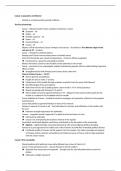

POTLR - Caesar as popularis and dictator
Notes on: - reasons for and significance of first triumvirate, his first consulship and its ‘popular’ programme, politics of the civil war ands Caesar’s reasons for pursuing it, his dictatorship, ‘anti-republican’ behaviour and attitude to the republic, his plans for ‘popular’ reform, reasons for his assassination, his relationships with other political figures - including Cicero, Cato, Pompey, Crassus and reasons for these
- Book & Paket-Deal
- Summary
- • 5 pages •
Notes on: - reasons for and significance of first triumvirate, his first consulship and its ‘popular’ programme, politics of the civil war ands Caesar’s reasons for pursuing it, his dictatorship, ‘anti-republican’ behaviour and attitude to the republic, his plans for ‘popular’ reform, reasons for his assassination, his relationships with other political figures - including Cicero, Cato, Pompey, Crassus and reasons for these
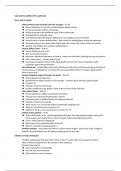

POLTR - Cato and the politics of the optimates
Notes on: - influence of stoic philosophy on Cato’s political life, Cato’s allegiance to the optimates and how this position affected his legal and political activities, his relationships with other political figures - including Cicero, Caesar, Publius Clodius Pulcher and reasons for these, his idealism compared to more pragmatic approaches to politics, his significance as a conservative in a changing political world
- Book & Paket-Deal
- Summary
- • 5 pages •
Notes on: - influence of stoic philosophy on Cato’s political life, Cato’s allegiance to the optimates and how this position affected his legal and political activities, his relationships with other political figures - including Cicero, Caesar, Publius Clodius Pulcher and reasons for these, his idealism compared to more pragmatic approaches to politics, his significance as a conservative in a changing political world
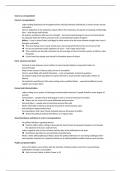

POTLR - Cicero as correspondent
Notes on: - Cicero’s correspondents and his relationship to them, form, structure and style of Roman letter writing, extent to which the letters can be informal or formal in tone, the choices of language and devices which create this, recurring ideas and themes in letters and their relationship to Cicero’s life and political career, public/private nature of the letters and their history of publication The letters included: to Pompey, fam. 5.7 to Atticus, att. 2.18 to Curio, fam. 2.4 to ...
- Book & Paket-Deal
- Summary
- • 4 pages •
Notes on: - Cicero’s correspondents and his relationship to them, form, structure and style of Roman letter writing, extent to which the letters can be informal or formal in tone, the choices of language and devices which create this, recurring ideas and themes in letters and their relationship to Cicero’s life and political career, public/private nature of the letters and their history of publication The letters included: to Pompey, fam. 5.7 to Atticus, att. 2.18 to Curio, fam. 2.4 to ...
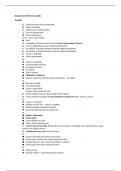

POLTR - the background of the late republic
Notes on: - roman social hierarchy - patrician & plebeian families, nobiles, equites, idea of a novus homo, res republica and organisation of the state - including the offices of the cursus honorum, elections, tribal assembly, centuriate assembly, senate, government of the provinces, imperium (command), dictatorship, ideas and views of the populares (favouring the people) and the optimates/boni (aristocrats/good men), role and importance of patronage, amicitia (alliance) and inmicitia (personal ...
- Book & Paket-Deal
- Summary
- • 4 pages •
Notes on: - roman social hierarchy - patrician & plebeian families, nobiles, equites, idea of a novus homo, res republica and organisation of the state - including the offices of the cursus honorum, elections, tribal assembly, centuriate assembly, senate, government of the provinces, imperium (command), dictatorship, ideas and views of the populares (favouring the people) and the optimates/boni (aristocrats/good men), role and importance of patronage, amicitia (alliance) and inmicitia (personal ...
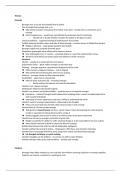
Hamlet - themes
Notes on themes of: revenge, madness, gender & sexuality, death and appearance & reality
- Summary
- • 4 pages •
Notes on themes of: revenge, madness, gender & sexuality, death and appearance & reality
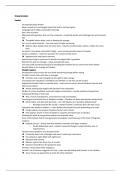
Hamlet - characterisation
Notes on all of the characters within Hamlet except the attendants/similar people who do not have a characterisation
- Summary
- • 8 pages •
Notes on all of the characters within Hamlet except the attendants/similar people who do not have a characterisation
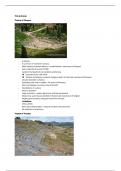
Greek theatre
Notes on: - pots and vases - the nature of tragedy - the nature of old comedy - drama and theatre in ancient Athenian society - literary techniques, structure of the plays and dramatic conventions - social and political themes in comedy - social, political and religious themes in tragedy
- Package deal
- • 7 items •
- Greek theatre - social, political and religious themes in tragedy • Summary
- Greek theatre - social and political themes in comedy • Summary
- Greek theatre - literary techniques, structure of the plays and dramatic conventions • Summary
- Greek theatre - drama and the theatre in ancient Athenian society • Summary
- Greek theatre - the nature of old comedy • Summary
- And more ….
Notes on: - pots and vases - the nature of tragedy - the nature of old comedy - drama and theatre in ancient Athenian society - literary techniques, structure of the plays and dramatic conventions - social and political themes in comedy - social, political and religious themes in tragedy

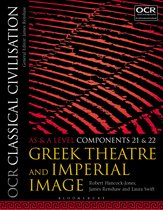
Greek theatre - pots and vases
Notes on all the prescribe sources for the OCR A-level, with dates, where it was found and information
- Book & Paket-Deal
- Summary
- • 13 pages •
Notes on all the prescribe sources for the OCR A-level, with dates, where it was found and information
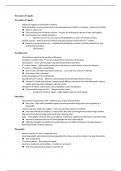

Greek theatre - the nature of tragedy
Notes on: - origins of tragedy and how it developed during the 5th century BC - including its relationship to satyr plays, the contribution of Aeschylus, Sophocles and Euripides, use of actors and the chorus, use of masks, costumes and props, common themes of tragedy, relationship between the cultural context and social matter of the plays, Aristotle’s theories about tragedies - including peripiteia (reversal of fortune), hamartia (tragic mistake) and catharsis (purging of emotions)
- Book & Paket-Deal
- Summary
- • 5 pages •
Notes on: - origins of tragedy and how it developed during the 5th century BC - including its relationship to satyr plays, the contribution of Aeschylus, Sophocles and Euripides, use of actors and the chorus, use of masks, costumes and props, common themes of tragedy, relationship between the cultural context and social matter of the plays, Aristotle’s theories about tragedies - including peripiteia (reversal of fortune), hamartia (tragic mistake) and catharsis (purging of emotions)
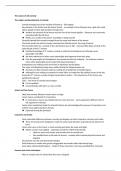

Greek theatre - the nature of old comedy
Notes on: - origins of comedy and how it developed during the 5th century BC - including the contributions of Aristophanes, use of actors and the chorus, use of masks, costumes and props, types of humour, comic techniques and effects, common themes of comedy, relationship between the cultural context and subject matter of the plays
- Book & Paket-Deal
- Summary
- • 2 pages •
Notes on: - origins of comedy and how it developed during the 5th century BC - including the contributions of Aristophanes, use of actors and the chorus, use of masks, costumes and props, types of humour, comic techniques and effects, common themes of comedy, relationship between the cultural context and subject matter of the plays
